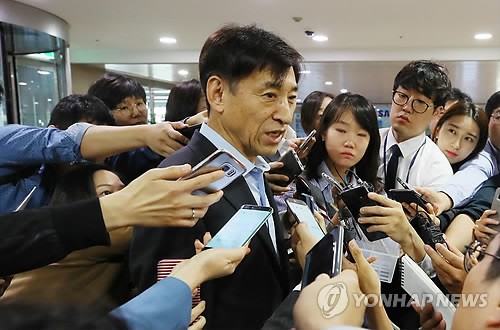
Lee Ju-yeol, governor of the Bank of Korea (BOK), told reporters that the U.S. rate hike will have a limited impact on the local financial market. He added the latest move has made it "more difficult" for South Korea to decide on its own key rate going forward.
As widely expected, the Fed lifted its key lending rate to a range of 2 percent to 2.25 percent. The rate gap between Korea and the U.S. has now widened to 0.75 percentage point.
The Fed also hinted that it will continue to keep marking up rates gradually, with many analysts expecting one more rate hike by the end of this year. If so, the rate gap between the two nations would be 1 percentage point.
"The Fed's rate hike is likely to have a limited impact on local financial market because it was widely expected," Lee said.
South Korea suffered a net capital outflow of 8.2 trillion won (US$7.35 billion) from the local stock and bond markets between May and July 2006, when the U.S.-South Korean rate gap stood at 1 percentage point.
That translated into a monthly average of 2.7 trillion won, nearly three times the amount of capital outflow when the rate difference was 0.5 percentage point or below.
South Korea's financial watchdog, the Financial Supervisory Service (FSS), held a meeting earlier in the day during which officials conducted checks on financial markets after the U.S. rate hike.
Yoo Kwang-yeol, first senior deputy governor of the FSS, told the meeting that local financial markets were calm because the U.S. rate hike was widely expected.
However, external risks are growing amid a widening rate gap with the U.S. and the simmering trade dispute between the U.S. and China, Yoo said.
Yoo called on financial firms to focus on risk management as volatility in financial markets has steadily increased. Source from the Yonhap.
























